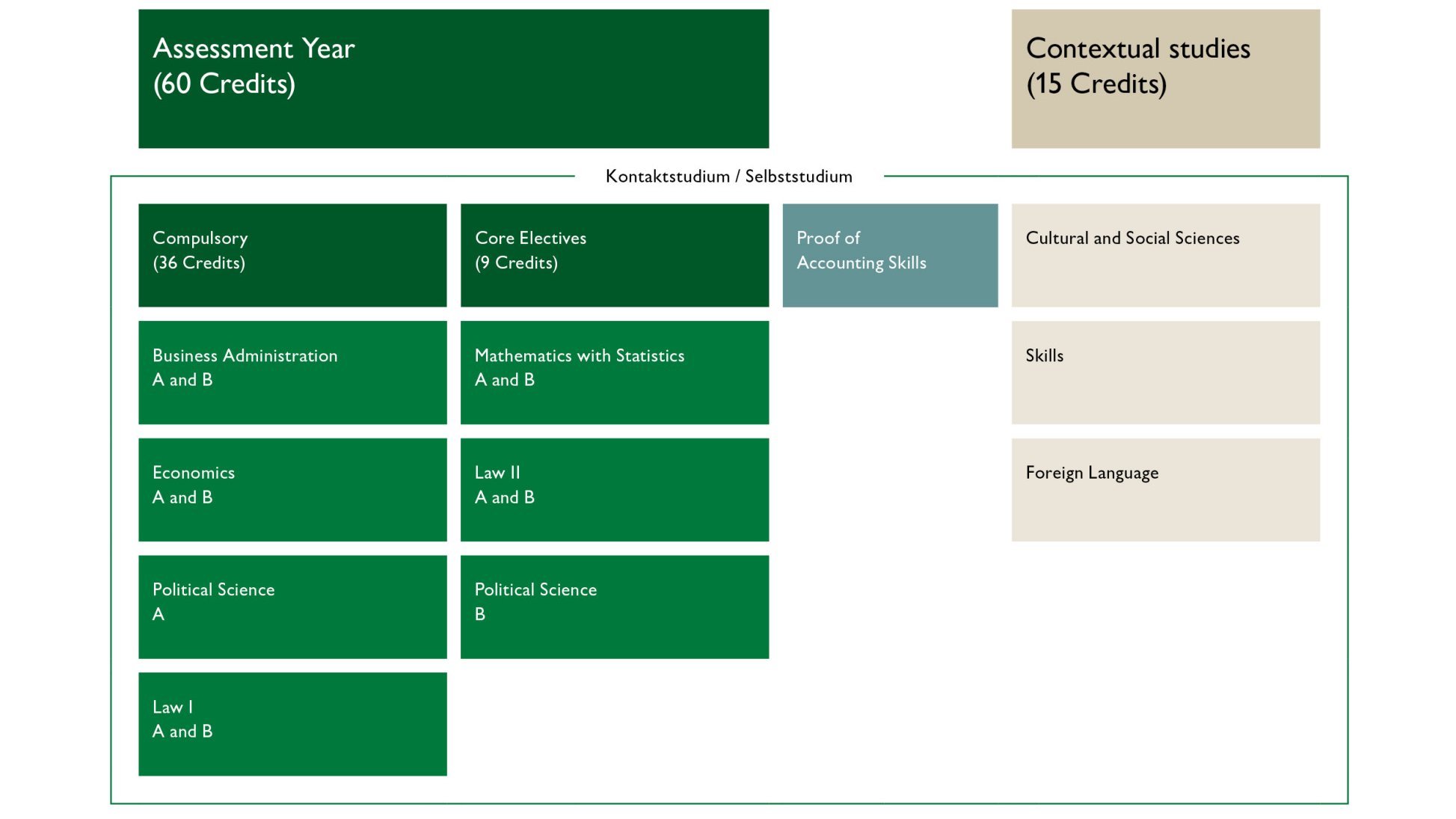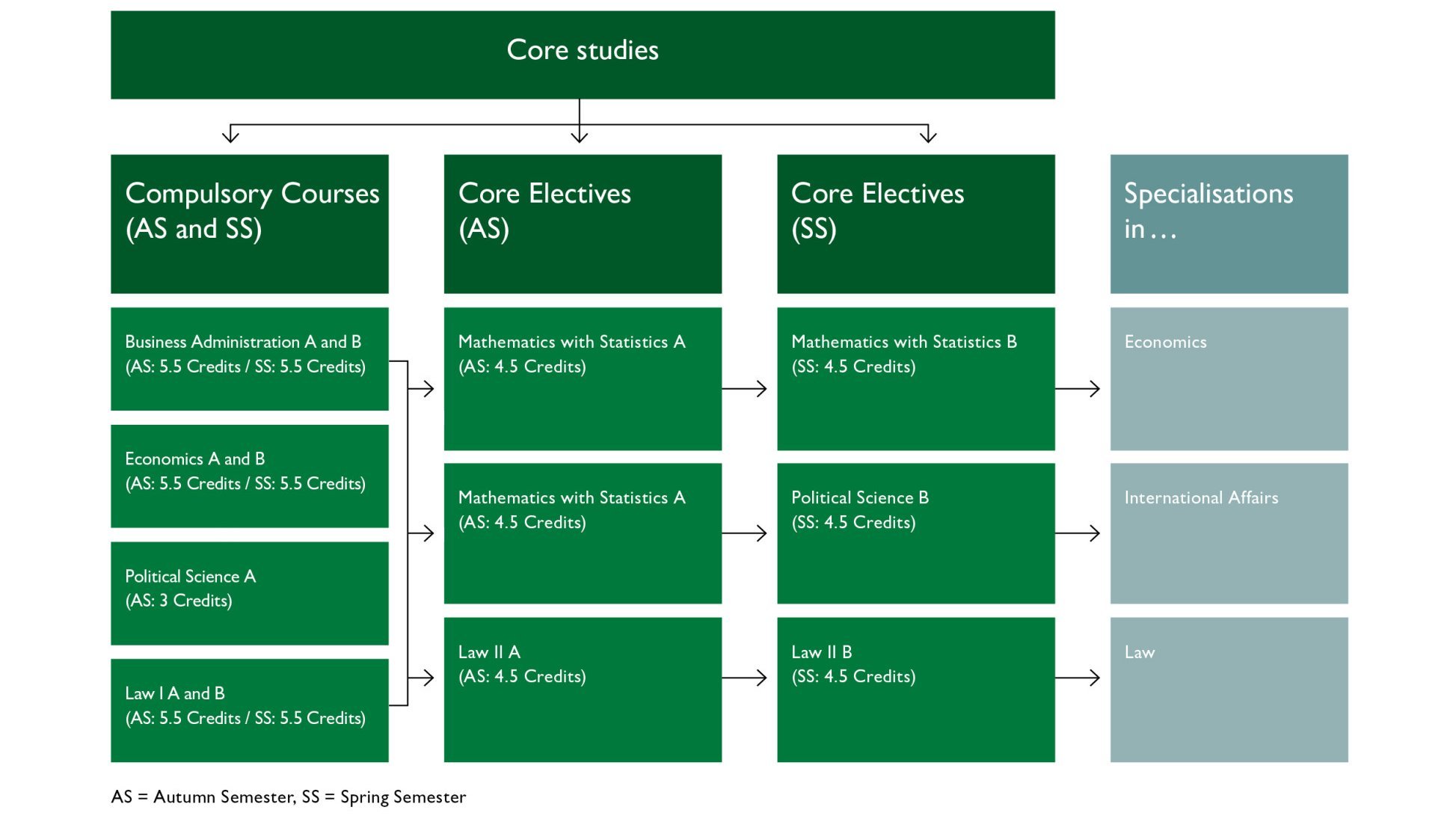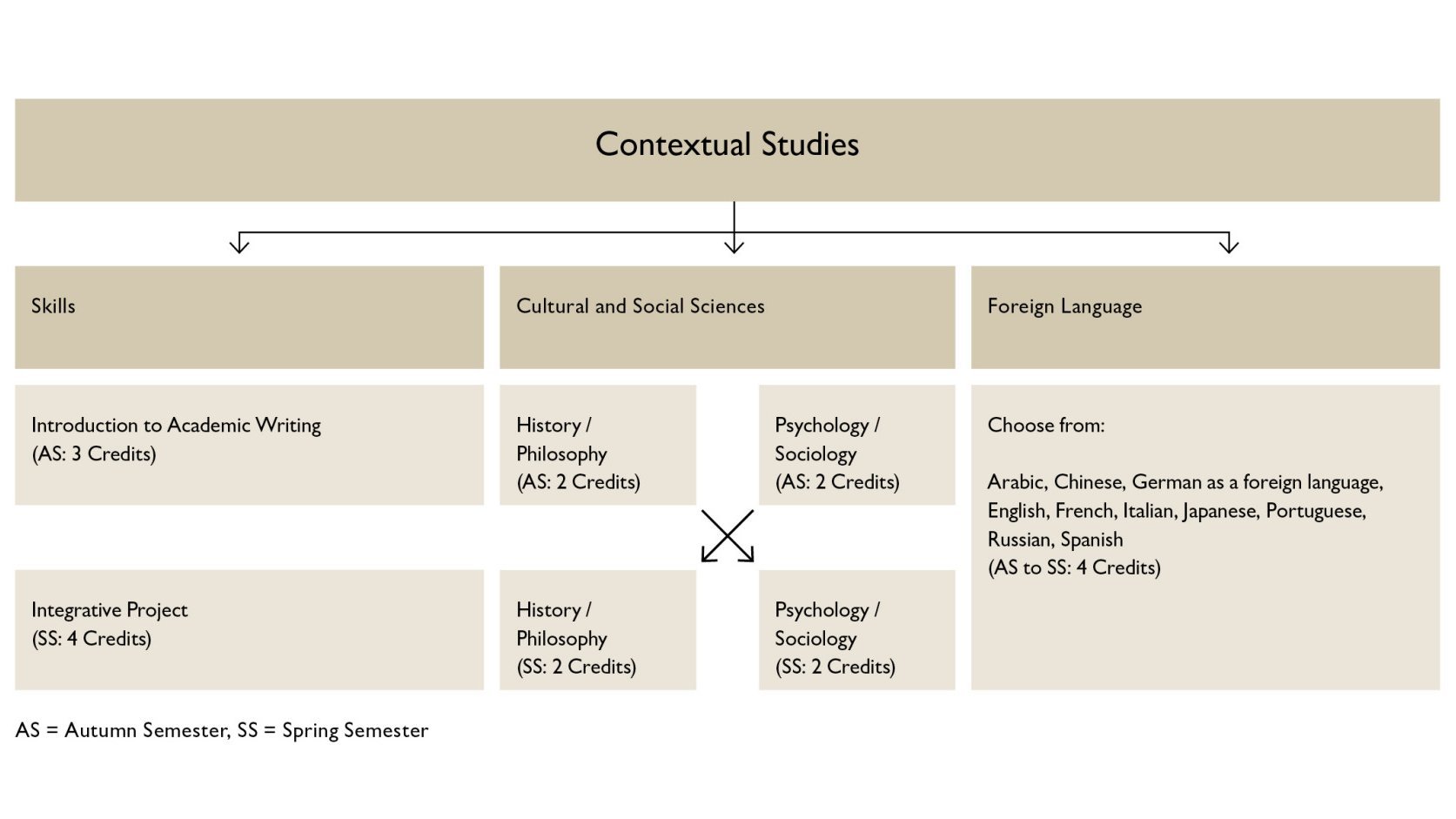

There are two central pillars in the curriculum: core studies and contextual studies. Core studies consist of a compulsory and an elective component. Contextual studies comprise three topics: skills, foreign languages and cultural/social sciences. In addition, proof of sufficient accounting knowledge must be provided.
The Assessment Year combines contact teaching (lectures and seminars) with self-study – for sustainable, independent learning.
The core studies form the basis of the Assessment Year. All students take the compulsory courses of Business Administration (A and B), Economics (A and B), Political Science (A) and Law (A and B). Depending on their chosen specialisation, they also choose from these elective courses: Mathematics with Statistics (A and B), Law II (A and B), or Political Science (B).
This chart shows which courses are compulsory and which are electives in each semester:

The following compulsory courses are part of your core studies:
The Business Administration courses teach key concepts and ways of thinking in modern management, based on the St.Gallen Management Model (SGMM). The focus is on a systemic, process-oriented understanding of management, organisation and the environment. Students examine strategy, digital transformation, marketing, production and supply chain management, as well as financial management and securing business success. In doing so, they learn to understand management tasks in the context of current social, economic and technological challenges and to shape them responsibly. The SGMM serves as a structuring frame of reference – in both lectures and exercises as well as in self-study.
Key topics:
The courses in Economics teach how human behaviour can be explained under conditions of scarcity – and what social orders develop as a result. You will learn how markets function, how people organise themselves in terms of the division of labour, and how economic, social and political processes can be explained and evaluated. In addition, the course addresses normative questions: When is government intervention necessary? What constitutes a functioning market order?
Key topics:
In the compulsory course Law I, all students receive an introduction to key areas of private and public law. The aim is to develop an initial understanding of legal thinking and the significance of law in an economic and social context. There is a particular focus on constitutional law, covering topics such as fundamental rights, state institutions and international regulations.
Key topics:
The courses in Political Science deal with how societies make and implement collectively binding decisions. The compulsory Political Science A course aims to provide an introduction to political science thinking and the systematic analysis of political structures and processes, with a focus on political responses to the climate crisis.
Students will learn how politics is organised at local, national and international levels. How do political systems differ from one another? What are the reasons for these differences? What consequences do these differences have for the ability of political actors to respond to societal challenges such as the climate crisis, digitalisation, or changes in the international order?
Key topics in the autumn semester (Political Science A): fundamental approaches and instruments for analysing political structures and processes; application using the example of climate policy
Depending on your Assessment Year specialisations, two elective courses must be added:
This course, Mathematics with Statistics (A and B), teaches key mathematical concepts for studying economics. It helps students to understand current economic publications and to further develop their analytical thinking skills. The focus is on economic applications and practical methodology, rather than mathematical formalism.
Key topics:
Students who choose to specialise in Law during the Assessment Year must complete the compulsory elective course Law II in addition to the compulsory course Law I. The courses are held exclusively in German and provide in-depth knowledge of two key areas of Swiss law.
Key topics:
Students who choose the specialisation International Affairs/International Relations in the Assessment Year must complete the compulsory elective course Political Science B in the spring semester in addition to the compulsory course Political Science A. The course is offered in both German and English. Political Science B takes an in-depth look at political processes at national and international levels.
Key topics:
Contextual Studies make up 25% of your study time. As ‘studium integrale’, they locate the Core Studies in diverse intellectual and cultural contexts.

The following topics are covered in your contextual studies:
In the Skills field, you will acquire important interdisciplinary methods that are essential for successful studies. You will learn how to work scientifically, analyse complex problems and solve them in teams. The courses combine theoretical input with practical exercises, promoting both individual and teamwork skills.
Key topics:
In the field of Cultural and Social Sciences, we offer seminars in history, philosophy, psychology and sociology. These seminars introduce you to humanities and social science approaches to culture and society, covering both historical and contemporary topics. The focus is on working with texts and learning the respective discipline's ways of thinking and understanding. The seminars aim to shed light on the social and cultural context in which the core subjects are located, to open up new perspectives and to critically reflect on developments. In the assessment year, you will attend a one-semester seminar in one subject from cultural studies (history or philosophy) and one subject from social sciences (psychology or sociology).
Examination formats:
Foreign language skills are an integral part of your bachelor's degree programme undergraduate studies – regardless of whether you study in German or English. There are ten languages to choose from in the contextual studies programme: Arabic, Chinese, German as a foreign language, English, French, Italian, Japanese, Portuguese, Russian and Spanish.
Compulsory requirements
During your undergraduate studies, you must provide evidence of proficiency in two foreign languages:
External evidence
Procedure during the Assessment Year
The languages taught at the University of St.Gallen start at a level equivalent to the Matura level at Swiss secondary schools. In terms of the levels of the Common European Framework of Reference (CEFR), this means:
| Language | Target level | Requirements |
| German | C1 | B2 |
| English | C1 | B2 |
| French | C1 | B2 |
| French | B2 | B1 |
| Italian | B1 / B2 | No prior knowledge is required for the B1 course. |
| Spanish | B1 / B2 | No prior knowledge is required for the B1 course. |
| Portugese | A2 | A1 |
| German | A2 | Only for students who have no knowledge of German at the time of registration. |
| Chinese | A1 | no prior knowledge required |
| Japanese | A1 | no prior knowledge required |
| Russian | A1 | no prior knowledge required |
| Arabic | A1 | no prior knowledge required |
Note: Some courses are also offered with English as the language of instruction.
Advanced courses for Italian & Spanish (B1 target level)
To help students achieve the B1 target level in Italian or Spanish by the end of the Assessment Year, intensive courses with double the number of hours are offered. These courses are ideal for students who want to deepen their knowledge of their chosen foreign language within a year.
Understanding business contexts requires a basic knowledge of accounting. This is why the accounting exam is compulsory for all students at the University of St.Gallen. Students must pass it by the end of the Assessment Year immediately before they are admitted to the Bachelor's programme. The corresponding introductory course, which covers the central fundamentals of accounting, takes place in the autumn semester.
Key topics: